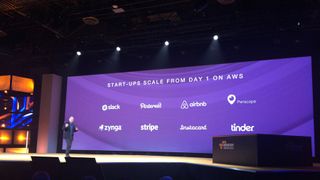Microsoft vs Amazon: Who will win the cloud clash in Europe?
Both companies have very different advantages to leverage

The fight between Amazon and Microsoft is well documented in the US. According to one analyst, it amounts to something of a "street battle," in which only one side can win and the spoils of which will make either company rich and powerful.
The story in Europe is similar, but has received much less attention despite it being far more interesting, mainly because it's in the early stages. According to an IDC estimate, the European market for cloud services is worth around $11 billion a year (about £7.5 billion, or AU$15 billion), which is not inconsiderable, and it's almost a fair toss-up between Amazon and Microsoft.
The two companies are taking vastly different approaches to the problem, which has been put into legal focus by a ruling last year that stated US companies could not simply ship customer data out of Europe. Instead, it must be stored on European soil.
Top down, bottom up
"Microsoft comes from the top down," said Giorgio Nebuloni, a researcher for IDC who focuses on systems and infrastructure in Europe, in an interview last year. "Amazon comes from the bottom up."
This difference may sound odd, but it means a lot. Essentially, Microsoft already has a ton of relationships with big corporations who use Office, Windows, and so on already. Selling them Azure, its cloud services infrastructure, should be easy and this is where the company excels.
Amazon, meanwhile, is much newer to the enterprise game having launched Amazon Web Services (AWS) in 2006. This means it can leverage the changing tides of the industry – adoption of technology, need to interact with customers, apps, and so on – to get in on the ground with newer, more nimble companies.

Big bucks and unicorns
Each has its upsides and downsides. Microsoft, for instance, lands the big contracts but may miss out on the next 'unicorn' – the term for a privately held startup valued at over a billion – while Amazon may get it.
Are you a pro? Subscribe to our newsletter
Sign up to the TechRadar Pro newsletter to get all the top news, opinion, features and guidance your business needs to succeed!
The two companies offer relatively similar solutions: Platform-as-a-Service, which is where apps live online, Software-as-a-Service, and Infrastructure-as-a-Service. All of these are, essentially, doing each respective thing for a monthly fee.
According to Ben Thompson, an independent analyst for Stratechery, Amazon has created an "internet tax" with AWS because it got in on the ground with a host of smaller companies which have now become much, much bigger.
"The larger AWS becomes," Thompson writes, "the greater advantage Amazon has in pricing AWS' services, which means they can earn ever more business." This, in turn, will likely end up with Amazon having its fingers in so many pies that its competitors can no longer keep up.
Don't rule out Redmond
According to a report from Gartner, this could well be true but Microsoft still has a fighting chance.
"In addition to this frustration on a technical front, enterprises both large and small often report a degree of dissatisfaction in the overall engagement process with AWS compared with other IT vendors that they purchase from," the report says, hinting at Amazon's biggest flaw.
"Buyers' decades-old habits and expectations don't change easily," the report continues, "and if established IT vendors can bring a credible competitor to market (as Microsoft has been able to do with Azure), Amazon will likely feel even more pressure in this area."
This disadvantage is unlikely to topple Amazon completely, but it could make it harder for the company to exert total control over the market for cloud services, especially in the kind of specific markets that are found within Europe.
"Amazon's advantage is that you don't always have to pander to the local markets," said Nebuloni. "However, that's one of the reasons why, in France in particular, there is an advantage for Microsoft because they have a local partner."
Max Slater-Robins has been writing about technology for nearly a decade at various outlets, covering the rise of the technology giants, trends in enterprise and SaaS companies, and much more besides. Originally from Suffolk, he currently lives in London and likes a good night out and walks in the countryside.
